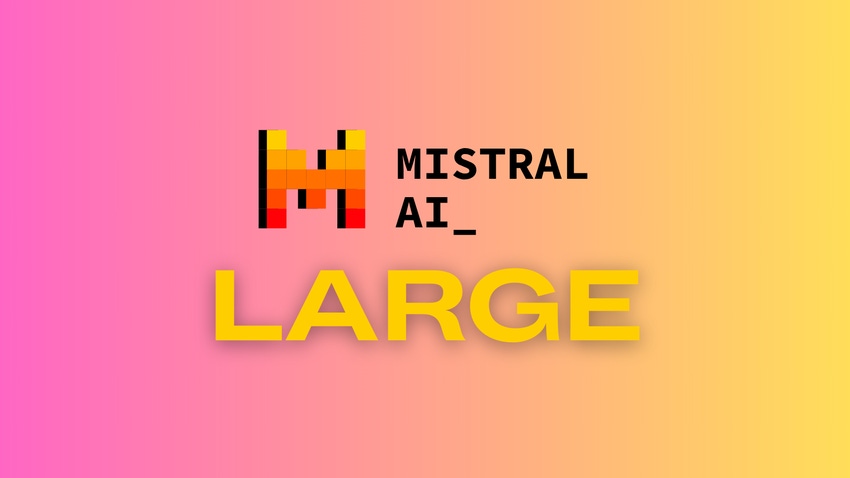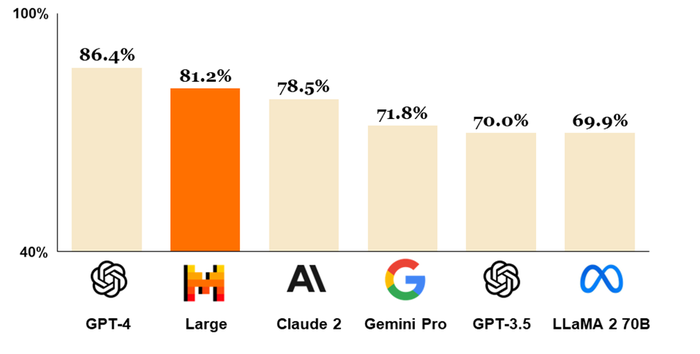Mistral Goes Large: Microsoft Deal, New Flagship Model
Mistral also unveiled an AI chatbot called 'Le Chat,' meaning cat in French and a play on the English word 'chat'

At a Glance
- Mistral models are coming to Azure as Microsoft takes a small stake in the startup. The EU said it will look into the deal.
- The new Mistral Large outperforms Google Gemini Pro. The startup also released a small optimized version, Mistral Small.
- Mistral also unveiled Le Chat, its ChatGPT rival that is powered by Mistral Large.
French AI startup Mistral AI has penned a multi-year partnership with Microsoft and launched a powerful new model, Mistral Large, that it claims surpasses Google’s Gemini Pro.
Under the agreement, Mistral Large will be available first on Microsoft’s Azure AI Studio and Azure Machine Learning platforms, along with its other models. Microsoft also invested a reported €15 million ($16.3 million) in Mistral, which would be turned into equity at the startup's next funding round.
Besides Azure, Mistral Large is available via the startup’s own platform, La Plateforme. It also launched a ChatGPT rival, called Le Chat (or cat in French), which is powered by Mistral Large.
Mistral Large is the startup’s largest and most advanced language model yet. It has outperformed Anthropic’s Claude 2, Google’s Gemini Pro and Meta’s largest Llama 2 model on the industry-standard MMLU test, according to the startup.
Mistral Large is the second AI model to achieve an MMLU score of above 80, beaten only by OpenAI’s GPT-4. Google has claimed that Gemini Ultra scored a whopping 90, though no technical report has been released at the time of writing to support the claim.

Model performance on measuring Massive Multitask Language Understanding | Credit: Mistral
Mistral Large is natively fluent in English, French, Spanish, German and Italian and holds a nuanced understanding of grammar and cultural context. The model has a context window length of 32k tokens – or around 24,000 words − so it can handle large documents.
Mistral Large features precise instruction-following, meaning businesses can tailor the model to fit their moderation policies. It also performs well at code and math-related tasks.
If the model is too large, Mistral released a new optimized version - Mistral Small. This smaller version is designed for lower latency workloads; the startup also claims that it costs less to run. It outperforms Mistral’s 8x7B, making it a more refined intermediary solution. There is also Mistral Next, which the startup describes as a "prototype model with extra concision."
Mistral 'can compete with Google or OpenAI'
Mistral’s deal with Microsoft is the second with a major cloud provider in a week. AWS announced just last week that Mistral’s models are coming to the Amazon Bedrock platform.
Mistal penned a similar distribution deal with Google Cloud last December, with its models available via the Vertex AI platform.
In its Mistral Large announcement, the startup said the model will be available initially on Azure, so it could still come to Bedrock and Google Cloud.
No word was mentioned as to whether Mistral’s AI would complement those from Microsoft’s AI strategic partner, OpenAI. Models from OpenAI power an ever-increasing library of Microsoft products including its subscription-based Copilots.
Microsoft was looking to diversify its AI partners to appease antitrust regulators, with reports pointing to a potential partnership with Databricks. But it has settled on Mistal, arguably the OpenAI of Europe, which could help ease anti-competition concerns.
The EU is probing Microsoft's partnership with OpenAI, in which it has invested at least $13 billion. Now, the European Commission will look into the Microsoft-Mistral tie-up, according to Bloomberg. If it leads to a formal investigation, the EU could sink the deal.
Mistral has been a strong advocate for open source AI models but its partnership with Microsoft does not mean it is changing course.
"We started with open source models, which anyone can deploy for free because that's a way of distributing them widely and creating demand. But from the outset, we have provided a business model with [the most powerful] optimised models," said Mistral cofounder Arthur Mensch, in an interview with French newspaper Le Monde. Commercializing the models will let the startup "finance the costly research required for model development."
Mensch also said Mistral, whose founders were researchers at DeepMind and Meta, "can compete with Google or OpenAI."
Read more about:
ChatGPT / Generative AIAbout the Author(s)
You May Also Like


.jpg?width=700&auto=webp&quality=80&disable=upscale)
.jpg?width=700&auto=webp&quality=80&disable=upscale)
.jpg?width=700&auto=webp&quality=80&disable=upscale)
.jpg?width=300&auto=webp&quality=80&disable=upscale)
.jpg?width=300&auto=webp&quality=80&disable=upscale)
.jpg?width=300&auto=webp&quality=80&disable=upscale)
.jpg?width=300&auto=webp&quality=80&disable=upscale)
.jpg?width=300&auto=webp&quality=80&disable=upscale)